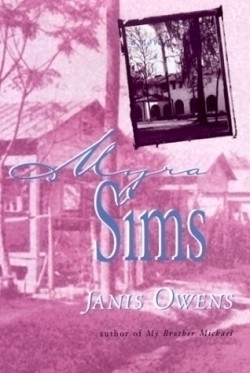Myra Sims
From the hardscrabble Pentecostal Bible-thumping wrong side of the tracks comes Janis Owens to re-tell her acclaimed debut novel My Brother Michael, this time in the voice of one of its main characters, Myra Sims.
Myra is the red-haired, painfully shy girl next door in fictional Magnolia Hill who loves Gabe Catts (narrator of My Brother Michael). Myra’s father, “a drinker and a womanizer and a hell-raiser to boot,” beats both Gabe and his father, then continues his physical and sexual abuse of Myra resulting in the headaches, denial and manic depression that plague Myra throughout her young life. Myra’s mother moves them to another town after the debacle, and she only sees her father a few years later as he is dying of diabetes and alcoholism. Myra, a “red-hot mama” at seventeen, stops to see Mrs. Catts and ends up pregnant by and married to Michael, the straight-laced hardworking older brother of Gabe, who has gone off to academia and hippiedom in the North.
Gabe’s visits home over the years both exacerbate and mollify Myra’s depression because they still love each other. The inevitable sexual affair ensues as the workaholic Michael and the lithium-soaked Myra are drifting apart. Gabe leaves again when their affair fizzles, so Myra rallies to defend her husband from Klansmen who threaten Michael (his foreman and best friend is black) at the factory he runs. This saves their marriage just in time for Michael to contract cancer and die. Gabe returns for the funeral, and with the help of the millions Michael left behind, Myra and Gabe finally get married, work out their problems (Gabe’s a recovering alcoholic, Myra’s trying to shake Pamalor, lithium, a whole cornucopia of anti-depressants), Gabe writes his book about all of them, and they both manage to tell Myra’s third child, Clay, that his father isn’t really Michael, it’s Gabe. It’s like Faulkner’s Snopes family transported to the 1990s.
Myra Sims is longer than My Brother Michael, less cynical, perhaps more conversational. Owens is a master of this genre, redneck realism, with its sudden brutal violence always assuaged by Jesus’ love. The non-literary episodic prose, the dialect, humor, and resilience of poor whites too proud to be trash, and the holy-roller faith in family and friends comprise an ingenuous narrative.
Owens’ voice is so everyday and human, one might expect to hear it in a beauty parlor next to a Wal-Mart out at the strip mall.
Reviewed by
Norm Wheeler
Disclosure: This article is not an endorsement, but a review. The publisher of this book provided free copies of the book to have their book reviewed by a professional reviewer. No fee was paid by the publisher for this review. Foreword Reviews only recommends books that we love. Foreword Magazine, Inc. is disclosing this in accordance with the Federal Trade Commission’s 16 CFR, Part 255.

